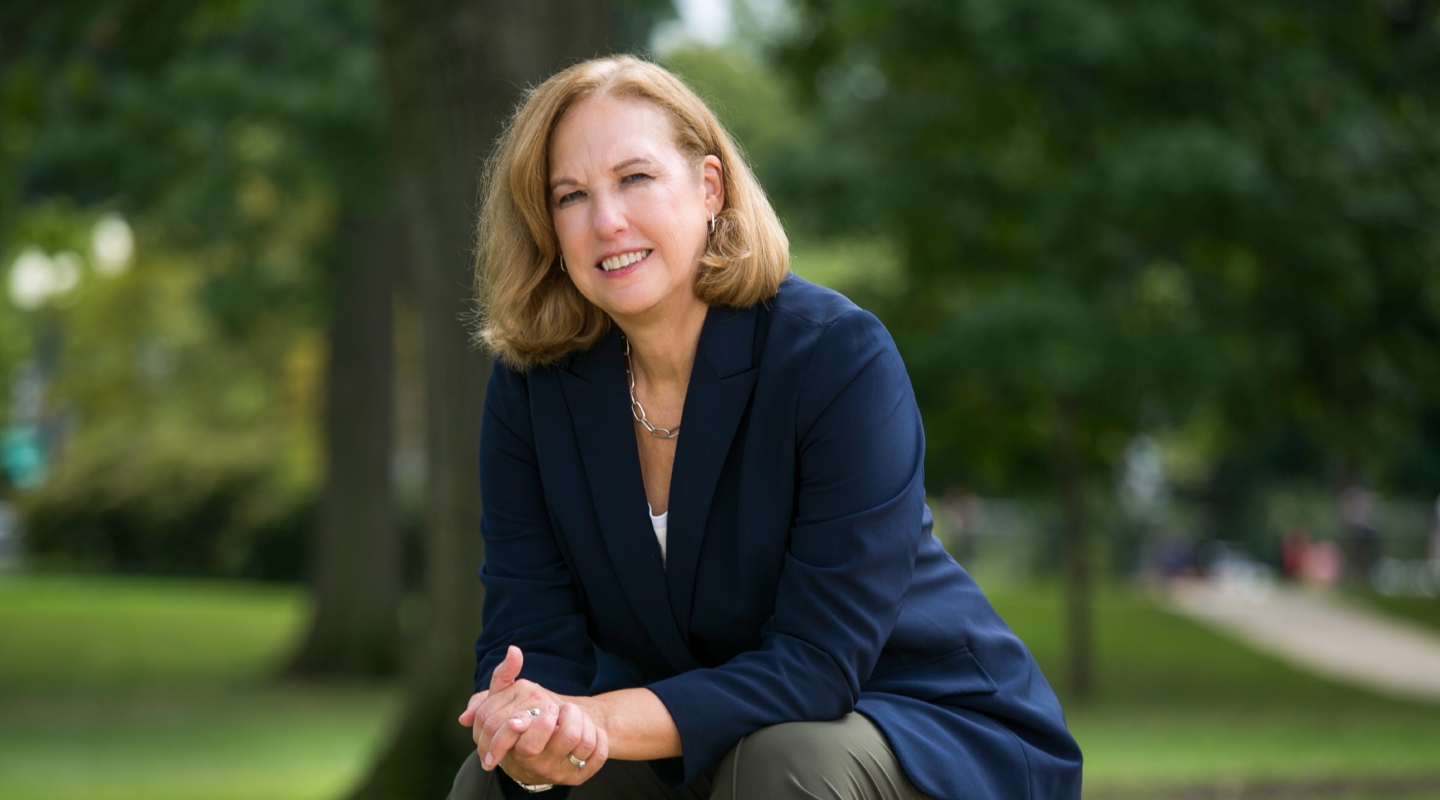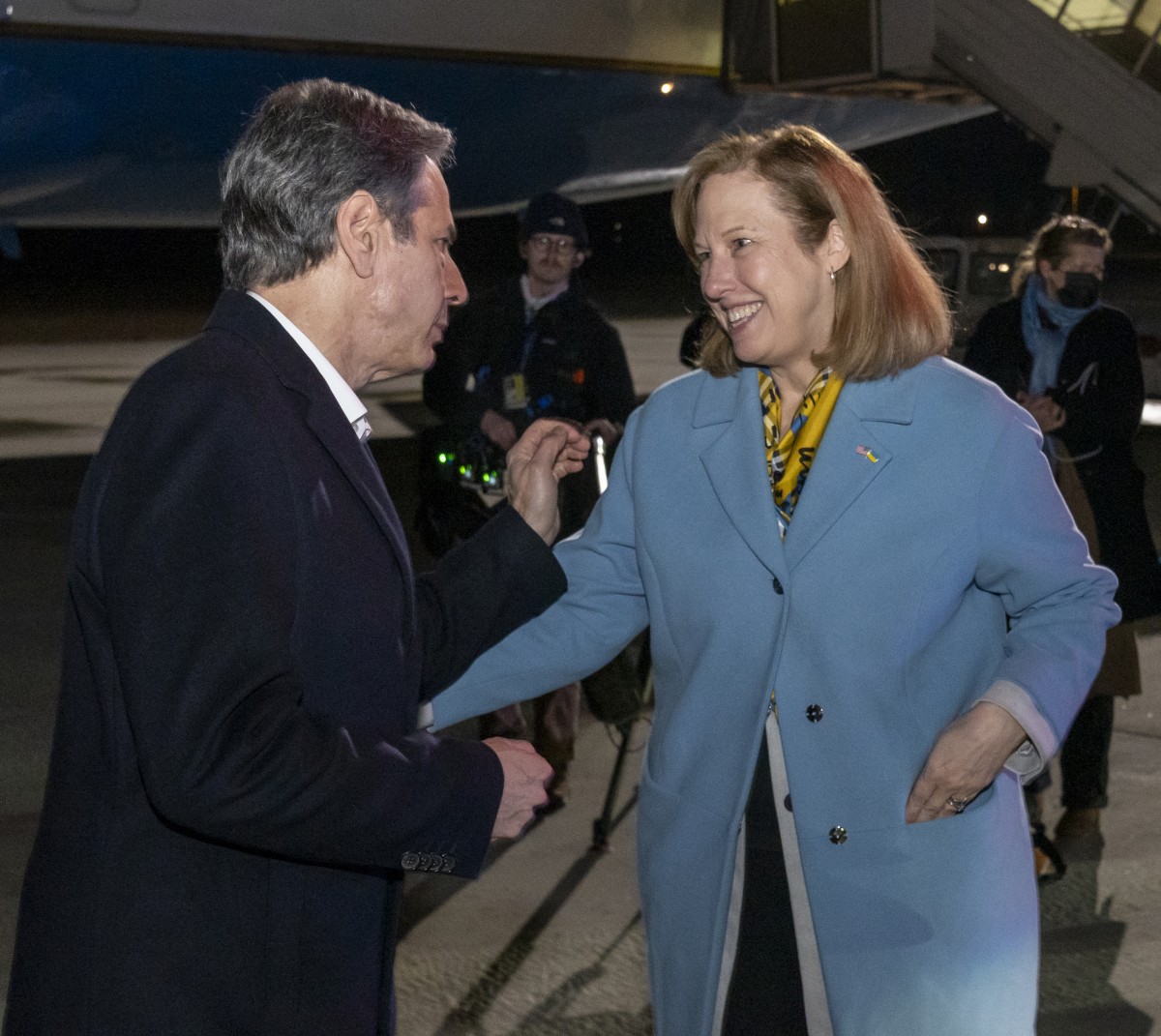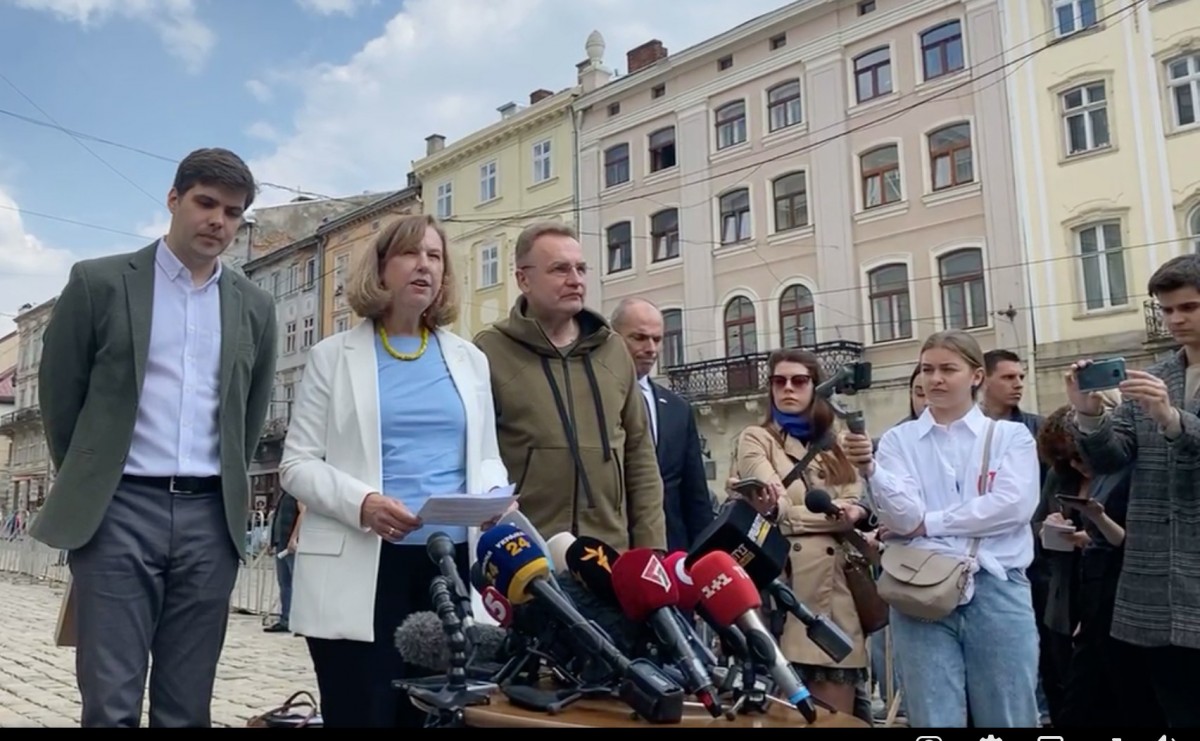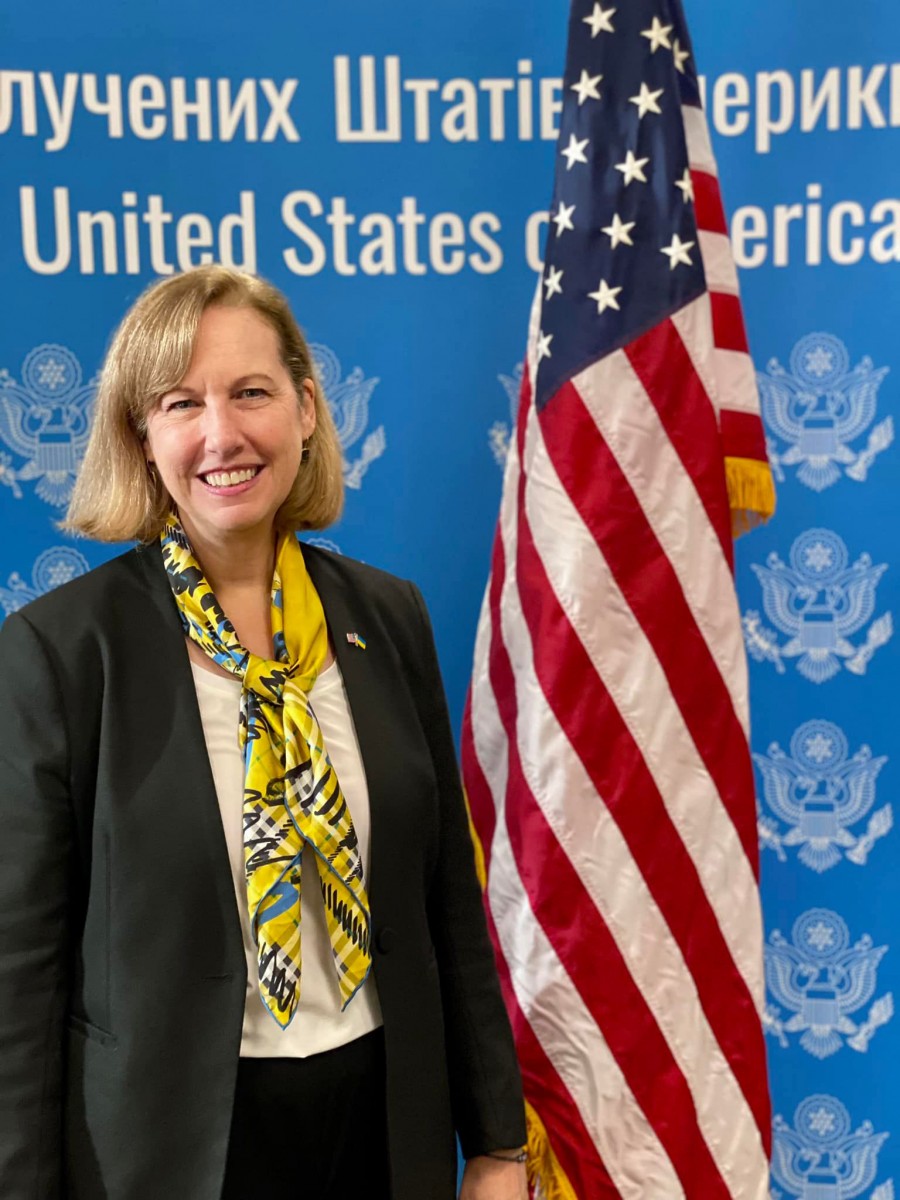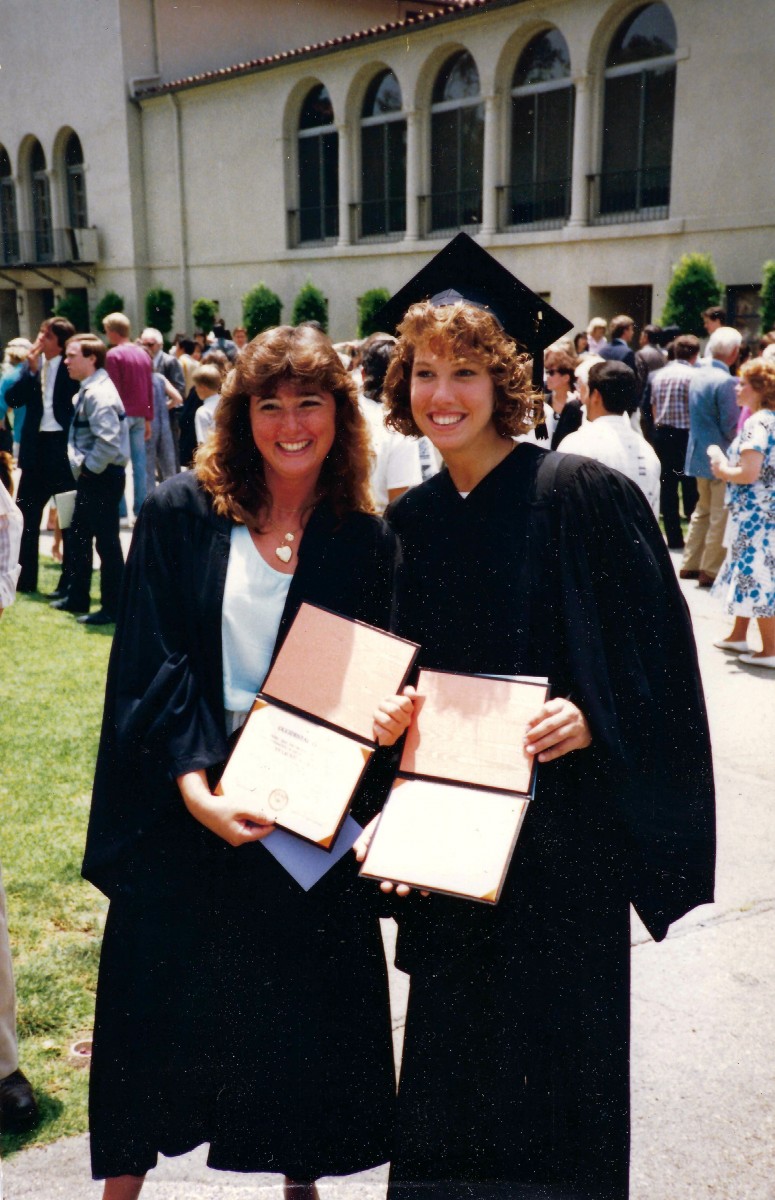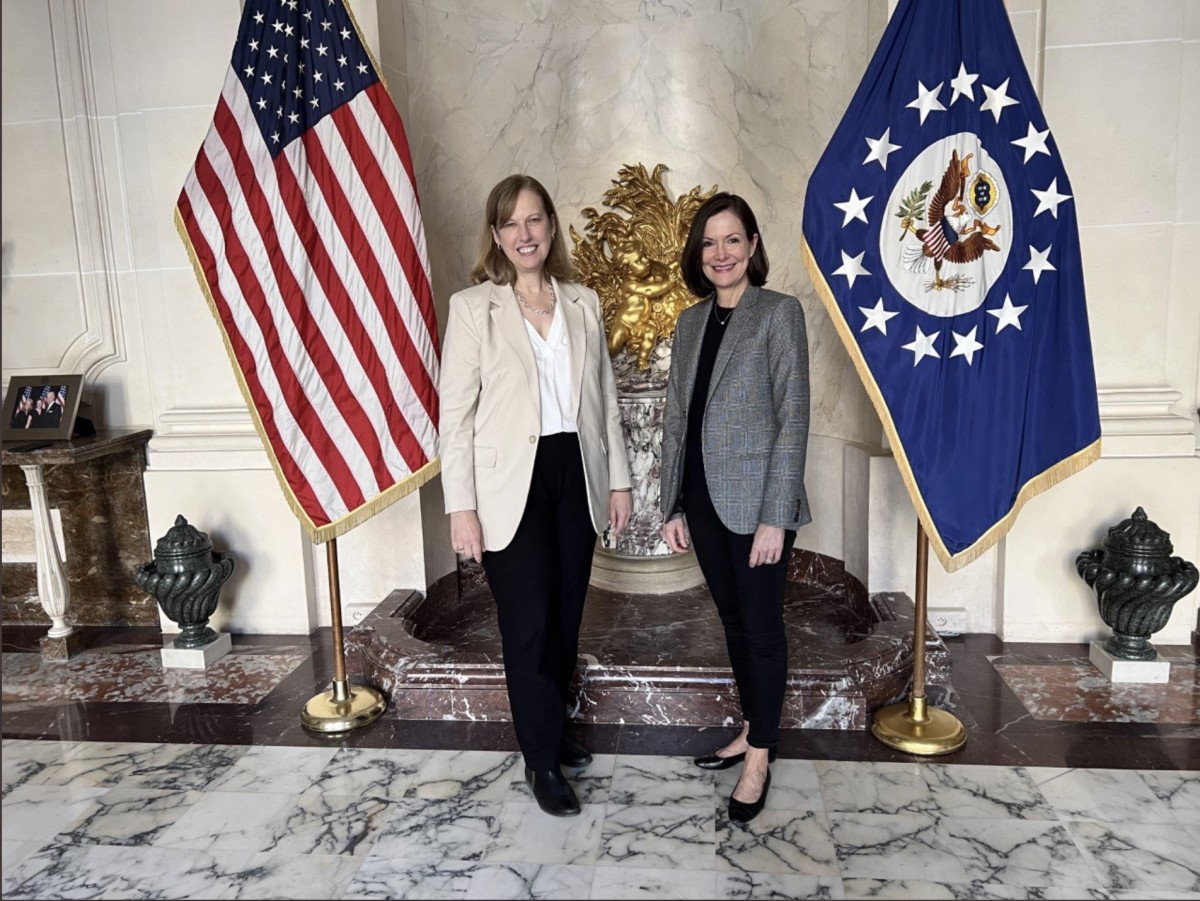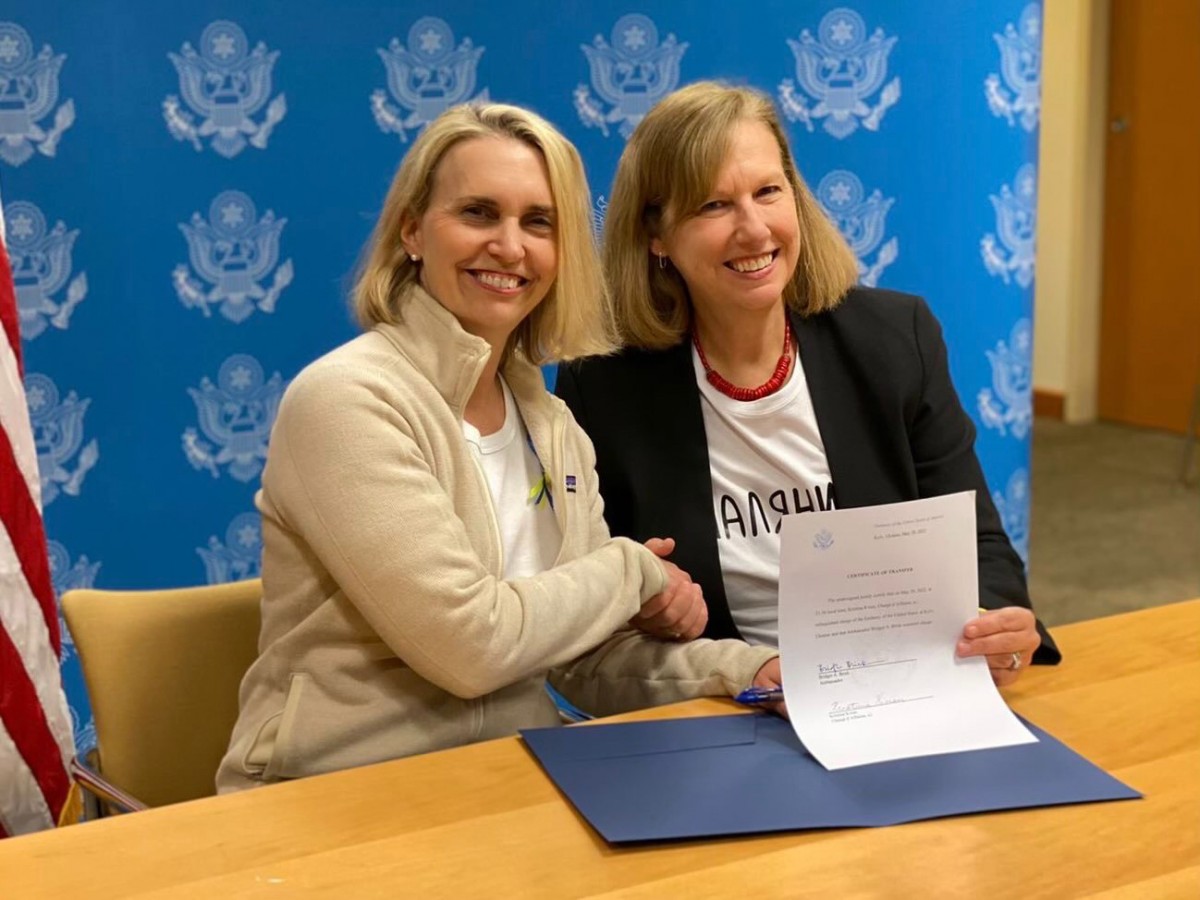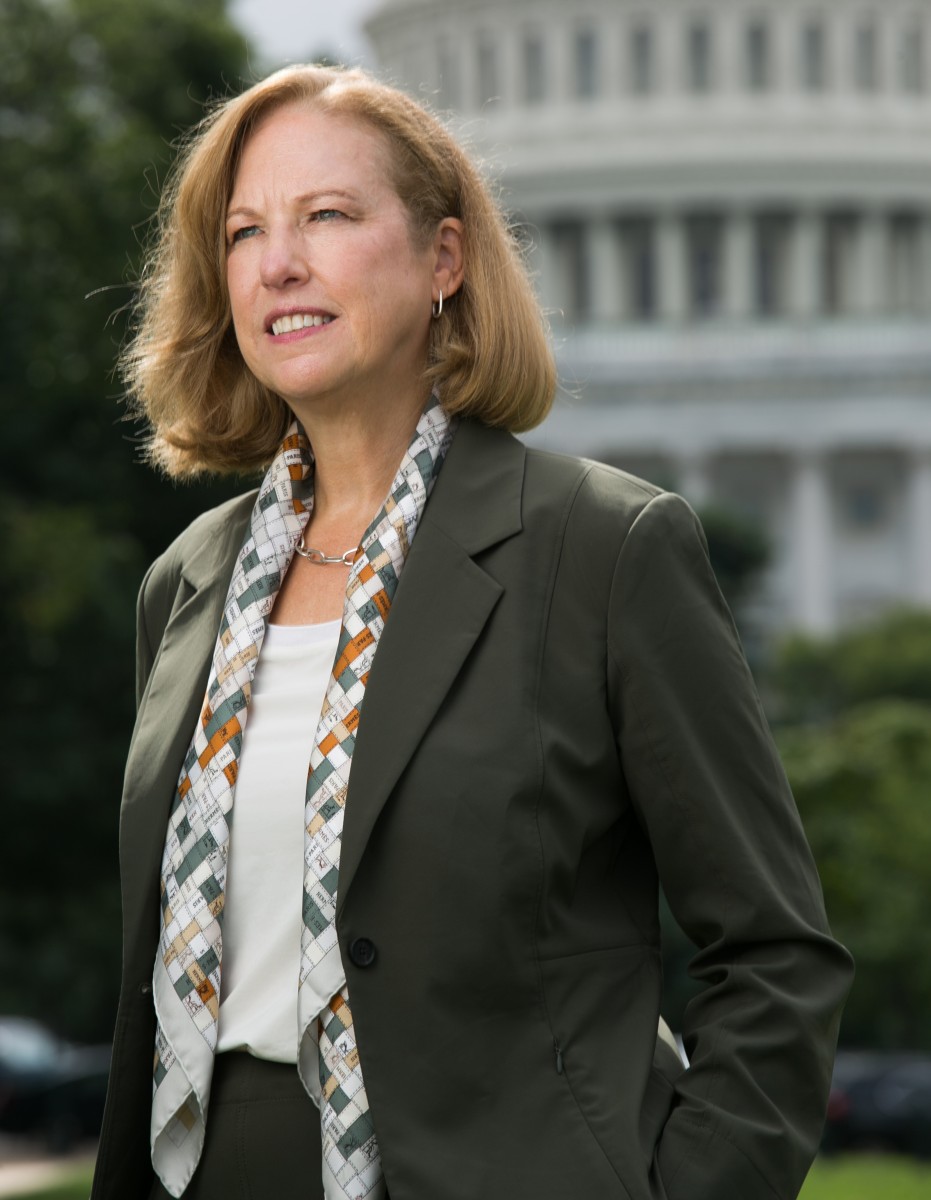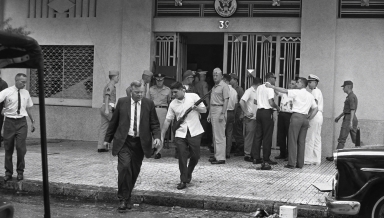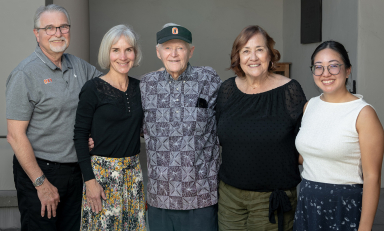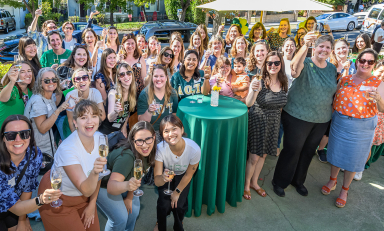For 2½ years, Kristina Kvien ’87 led U.S. diplomacy efforts inside the embattled and resilient nation—her latest post in a 30-year career with the Foreign Service
The New Year began with alarm bells ringing for Kristina Kvien ’87, the United States’ top diplomat in Ukraine. As chargé d’affaires—a position she had held since January 2020—she was working with colleagues to lead the on-the-ground U.S. response to what was looking increasingly like an imminent Russian invasion. Russian President Vladimir Putin had been doubling down on rhetoric that denied the right of Ukraine (which became an independent nation in 1991) to even exist—a notion hard to square with the idea that he might be looking for an off-ramp to war. Yet, as part of the U.S. strategy, Kvien and others tried to keep an exit in place—even as they publicly and pointedly called out false flags that intelligence indicated were in the works.
By mid-February, Kvien and the remaining core embassy staff departed the five-story office building in Kyiv and set up temporary headquarters some 336 miles to the west in L’viv, in western Ukraine. One hundred and fifty thousand Russian troops were massed on Ukraine’s borders, even as the Kremlin claimed that it was drawing down. “Frankly, President Putin lies, and he’s done it before,” Kvien told NPR. “He’s doing it now. … His suggestion that somehow they’re pulling back is simply false.”
On February 21, Putin delivered a speech denying once again that Ukraine had even a tradition of statehood, portending an imminent Russian invasion. In a press conference in L’viv, Kvien responded by calling Putin’s comments about Ukraine “delusional” and pledging “a forceful response from the United States, our allies and partners.”
That night, Kvien and her team moved across the border to Poland and set up U.S. operations in a hotel in the city of Rzeszów. Then, early on the morning of February 24, Russian rockets were launched at targets across Ukraine and tanks rolled across the border as Russia began an unprovoked war of aggression of a scale Europe hadn’t witnessed since the end of World War II.
In announcing the so-called special military operation, Putin warned against American interference, saying it would bring a response “unlike any you have seen in your history.” For Kvien and her colleagues stateside, the goal was to help Ukraine without starting World War III.
The national anthem of Ukraine is “Ukraine Has Not Perished Yet.” By the end of March, that had taken on new resonance. The Russian plan to take Kyiv within days and decapitate Ukraine’s government had failed. Ukrainian troops began liberating towns near Kyiv, including Bucha and Irpin—bucolic bedroom communities that had been home to young families, as well as Ukrainian staff at the U.S. Embassy and Ukraine’s ambassador to the United States, Oksana Markarova. Russian forces left behind a trail of devastation and slaughter—proof, Kvien told CNN, that “President Putin is a butcher.”
On May 2, Kvien returned to Ukraine. “We are thrilled to be back!” she said at a press conference in L’viv, and expressed hopes that the embassy would reopen in Kyiv by month’s end. “Today, it is clear that Putin has made a historic miscalculation in his unprovoked and unjustified attack on Ukraine,” she said. “Ukrainians have shown the world what true heroism is—from the border guards at Snake Island who told a Russian warship what it could do to itself, to Azov regiment’s fearless defense of Mariupol, to President Zelensky and the entire Ukrainian government working throughout attacks on Kyiv while brave defenders defeated approaching Russian forces.”
After the embassy reopened, Kvien journeyed to Borodyanka, northwest of Kyiv, to bear witness to the horrors wrought by Russian invaders there. Home to some 14,000 people before the war, Borodyanka was now, in the words of Ukrainian journalist Olena Makarenko, “nightmarish carcasses of the apartment blocks hit by Russian bombs, rockets, and shells.” Hundreds of civilians likely died in artillery strikes. In the small park stood a monument to poet Taras Shevchenko—the statue’s forehead now riddled with bullet holes.
Growing up in Fresno, Kvien was fascinated with politics and government by the time she got to high school. International travel was not part of her upbringing, though her mother (Karen Lindquist ’62) was a travel agent. While her political science major at Oxy didn’t require a declared concentration, in practice she found one, thanks to Larry Caldwell, the Cecil H. and Louise Gamble Professor in Political Science Emeritus. Kvien took Caldwell’s yearlong Soviet studies course, as well as other courses focused on the Soviet Union or Eastern Europe. “I really enjoyed [Caldwell] as a professor, and I was intrigued by the subject,” she says.
In 1985, Mikhail Gorbachev was elected general secretary of the Soviet Union and soon embarked on a series of historic reforms. During Kvien’s senior year, Gorbachev and President Ronald Reagan met in Reykjavík, Iceland, inaugurating sweeping efforts to reduce the threat of nuclear weapons—a turning point in the Cold War.
Kvien’s studies at Oxy sparked such an interest in working as a diplomat that she took the Foreign Service exam her senior year—passing the written portion but not the oral tests. After graduation, she tried again and passed both. “Oxy is pretty good at inculcating resilience,” Kvien says. “If I had quit after the first time, I wouldn’t have made it in.”
She joined the Foreign Service in 1992, when new embassies were opening in countries that had formerly been part of the USSR. “It was a momentous time in international relations,” Kvien says. “It was a period of a lot of optimism”—in which idealism and a sense of being a part of history put a luster on government service.
Kvien studied French at Oxy, which proved useful for her first assignment, in Paris. Foreign service officers typically focus on one area of expertise—for instance, political, economic, or consular. Kvien opted for the economic track and arrived in Europe shortly after the signing of the Maastricht Treaty, which paved the way for a single currency and the formal creation of the European Union in 1993. Post-communist economies to the east also were being transformed.
Her next assignments took Kvien to the Philippines and then back to Washington, D.C., tackling EU and Organisation for Economic Co-operation and Development issues. She worked as a desk officer on Slovenia. She served in Brussels and then Moscow, responsible for environment and trade issues. She added Russian to her languages. Detailed to the National Security Council, she worked with a portfolio that encompassed Ukraine, Belarus, and the European Union. She served in London overseeing U.S.-U.K. economic relations and served as economic counselor and acting deputy chief of mission in Bangkok, Thailand. When she arrived in Ukraine in 2019, she was coming from an assignment as economic minister counselor and acting deputy chief of mission—DCM in foreign-service speak—in Paris.
In spring 2019, Ukraine transfixed the world with its presidential elections as Zelensky, a former comedian turned media entrepreneur and executive, was swept into office with 73 percent of the vote. The election was “competitive and held with respect for fundamental freedoms,” the Organization for Security and Cooperation in Europe assessed. “The orderly transfer of power should offer the opportunity for strengthening democratic institutions and their accountability.”
Days later, then-U.S. Ambassador to Ukraine Maria Yovanovitch was recalled to Washington—two months before she was scheduled to finish her assignment. (Details of behind-the-scenes efforts to undermine her would figure into the first impeachment of President Trump in 2020.)
Soon after that, Kvien arrived in Kyiv as part of the U.S. mission. She was no stranger to the city: While serving on the National Security Council from 2008 to 2010, she visited Ukraine twice. William Taylor, ambassador to Ukraine from 2006 to 2009, returned to serve as chargé d’affaires in June 2020. Kvien assumed the role of DCM, overseeing the internal functions of the embassy. As a career foreign service officer, “I really try to avoid politics,” she says.
Kvien’s husband joined her in Kyiv, as did their 14-year-old Moscow street cat, Snickers. (Daughter Hanna White ’20, then a rising senior at Oxy, lived with them and worked for the embassy during that first summer as well; she is now a teacher in Washington, D.C.)
In January 2020, Taylor left Kyiv, and Kvien took over as chargé d’affaires. Before the war, U.S. priorities included working with the Ukrainian government to reduce corruption, stabilize energy consumption and development, and rein in oligarchs to show that they were not above the law. Judicial reform was one prominent example, and building buy-in with Ukrainian leaders was key. “Ultimately, we succeeded because President Zelensky became convinced that Ukraine needed judicial reform,” Kvien says. “Without him saying, ‘You’ve got to get this done, this is my current priority,’ it would not have been able to happen.
“Until the war started, they were making progress, and I think that’s ultimately what will lead them to meeting EU requirements for membership and to having a more vibrant economy,” she adds. Kvien points to the 2019 elections in Ukraine and the successful democratic transition—something Russians have not had in this century. There is a vibrant NGO sector and a thriving free press—including outlets that, prior to the war, were unabashedly critical of the Ukrainian government.
Kvien led the embassy through the COVID-19 pandemic, which has claimed more than 100,000 lives in Ukraine and severely curtailed travel. In February 2021, she got her first glimpse of the war that Russia had brought to Ukraine’s Donbas region in 2014. With Zelensky and several other diplomats, she traveled to Avdiivka on the so-called line of contact. They saw the devastation and witnessed what in theory was a ceasefire in which Russian-backed forces used snipers, mortars, and artillery to attempt to provoke Ukrainian troops to respond. Since April 2022, Avdiivka has seen fierce fighting again, after Russian troops began a push; as of September, Ukrainian forces still hold there.
As a diplomat, Kvien comes across as down-to-earth and plain-spoken. While she served as top U.S. diplomat in Ukraine for 2½ years, she managed to lead without the title of ambassador. At the beginning of 2022, President Joe Biden had yet to formally nominate anyone for that post. Talking to Politico in January, former U.S. Ambassador to Ukraine Stephen Pifer remarked that Kvien “is doing a superb job. … Why not nominate her?” Former ambassador William Taylor “enthusiastically agreed,” the website reported.
The Senate quickly confirmed Brink, who arrived in Kyiv on May 30, bringing Kvien’s assignment in Ukraine to an end. As gratitude for her support and solidarity, Zelensky presented Kvien with Ukraine’s Order of Merit.
It had been 99 days since Russia launched a full-scale invasion and began a war whose consequences will extend far beyond the boundaries of Ukraine. Russia had invaded Georgia in 2008, and Crimea and Donbas six years later. “Putin has been pretty clear in some of his more recent statements about how he really sees things—that all of the former Soviet Union should be Russian,” Kvien cautions. “That includes some NATO members.”
Shortly after Kvien returned to Washington, D.C., Biden nominated her to serve as U.S. ambassador to Armenia on July 11. (Kvien’s hometown, Fresno, has long been home to a large and active Armenian community.) If confirmed by the Senate, this will be her first post with the title of ambassador.
Armenia shares borders with Iran, Turkey, Georgia, and, most significantly, with Azerbaijan, with which there has been a long-simmering conflict over the Nagorno-Karabakh region. Along with efforts to pursue a lasting political solution to the conflict, U.S. priorities include strengthening democratic institutions and fostering “sustainable and inclusive economic growth.”
“That is why I think, ultimately, Russia made the decision” to invade Ukraine, Kvien says. Putin’s playbook called for false flags, dividing allies, spinning absurd lies, and working assumptions that what Russia was saying and Ukraine was saying might both be partially right, and somehow the truth lay somewhere in the middle. “In this particular conflict, there is definitely no middle truth,” Kvien says. “There is one truth, and the truth is Russia invaded Ukraine with no provocation and no international legal justification.”
During the war in 2022, the city of Mariupol has become synonymous with Russian cruelty and destruction. In June 2021, Kvien saw it in its summer seaside splendor; she had traveled there and to the southern port city of Berdyansk to visit a border guard station supported by a State Department program.
Kvien looks forward to a time when Ukraine’s main focus can be meeting the EU objectives “and not having to fight a war with Russia. Ukraine is striving to join the community of democracies that work together to make a better world and make a better environment for their own people in their home countries,” she says. “Ukraine has the weight of history on its side.”
Beyond the devastation of the current war, there are the deeply troubling implications of a world where, if Russia succeeds, global relations are reduced to “might makes right.” “A new series of threats have arisen, not just authoritarianism,” Kvien cautions. “Environmental threats have become more serious in the last 30 years. When we see drought, this leads to food insecurity and famine.”
And yet, she says, “As optimistic as I was in 1992 when I joined the State Department, I’m not un-optimistic now. You have to continue to solve the challenges and threats that are put in front of you.”
Steven Boyd Saum is the editor of WorldView magazine. He served with the Peace Corps and led the Fulbright program in Ukraine, where he also has served as an election observer. Photos (unless noted) from U.S. Embassy Kyiv Ukraine Facebook page. Blinken photo by Ron Przysucha/State Department. Commencement photo courtesy Harriet Schwartzman '87.

